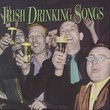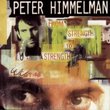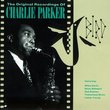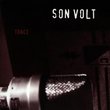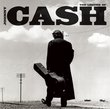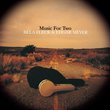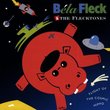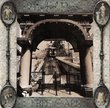| All Artists: Dolorean Title: You Can't Win Members Wishing: 0 Total Copies: 0 Label: Yep Roc Records Original Release Date: 1/1/2007 Re-Release Date: 2/20/2007 Genres: Alternative Rock, Folk, Pop, Rock Styles: Indie & Lo-Fi, Singer-Songwriters Number of Discs: 1 SwapaCD Credits: 1 UPC: 634457210929 |
Search - Dolorean :: You Can't Win
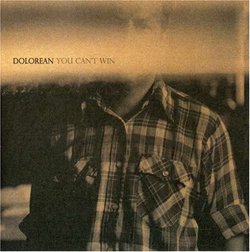 | Dolorean You Can't Win Genres: Alternative Rock, Folk, Pop, Rock
Al James's affinity for seat-of-the-pants recording lives on in Dolorean's fourth album, a browbeaten collection of broken bonds and career setbacks that, over a single winter recording weekend, became inverted into yet an... more » |
Larger Image |
CD DetailsSynopsis
Amazon.com Al James's affinity for seat-of-the-pants recording lives on in Dolorean's fourth album, a browbeaten collection of broken bonds and career setbacks that, over a single winter recording weekend, became inverted into yet another ear-tingling folk-pop gem for the Portland, Oregon, singer-songwriter. The piano- and guitar-based band is essentially a forum for the barren and lingering compositions of its erudite leader, and James takes great pleasure in both its minimal backing and studio time that is organic and free. And not unlike on previous records, his gentle, nearly undecipherable voice lines up in lockstep with the absorbing comments and questions that begin his songs, such as "Heather, I'm on a plane that I pray won't get off the ground" (in the yearning waltz "Heather Remind Me How This Ends") and "How can you fall in love with the target when I am the gun?" (in the ballad of skepticism "In Love with the Doubt"). The melodies may be slow-moving and the instrumentation laid bare, but this Dolorean package is far more optimistic than intended and supplies the soundtrack for life in general. --Scott Holter Similarly Requested CDs
|
CD ReviewsAnother slow-burner from Al James and the gang Elliot Knapp | Seattle, Washington United States | 02/21/2007 (4 out of 5 stars) "As the first few minutes of Dolorean's new album (the title track "You Can't Win") wash over your ears, you'll probably notice that this isn't exactly the same band that created 2004's Violence in the Snowy Fields. The album opens with a decidedly different ambiance than their other records (in many ways the mood is like James' friends, collaborators, and label-mates The Standard). Eventually James' familiar, soothing, whisper-like voice chimes in, delicately intoning "You can't win." Those are the only lyrics in the song, backed by some keys, a droning bass, and some soaring background vocals. It's a new sound, and a new experiment for Dolorean, repeating an evocative phrase and letting the music push and pull different meanings out of it. In many ways, a lot of the rest of You Can't Win is growth from Dolorean's previous efforts--"We Winter Wrens" utilizes some tasteful banjo, there's a bigger lead guitar presence (at least on the first half of the album, sometimes sounding like a nod to the guitar in Bill Fay's Time of the Last Persecution), the band experiments with some effects on James' vocals and the overall mix (listen to the beginning of "You Don't Want To Know," cousin of the title track), and there's an overall emphasis on some beautiful, ethereal background vocals that didn't really show up on previous albums. It can also be noted that the strong religious themes that were present in the last album are virtually absent here. In many ways, You Can't Win brings out a lot more subtlety in arrangement, and a lot of it really sounds great. In some ways, some of the changes on this album don't work as well. Violence in the Snowy Fields contained a number of tracks with more upbeat rhythms, which I thought was a really enjoyable change of pace from the mostly downbeat Not Exotic. Most of the tracks on this album are really downtempo, which does fit James' melancholy lyrics, but I sometimes find myself wishing he'd experiment with some irony (i.e. faster tempo combined with serious subject matter). Although it's not a problem with composition, the lack of diversity does hold the album back from fitting more than one mood--one of mellow contemplation. Additionally, from someone who professes such a love for Dennis Wilson, Bill Fay, Gene Clark, and Levon Helm, I sometimes think Al James' music might benefit if he took a lesson from his heroes and cranked up the vocals a notch from the weary, whispery sounds that are his trademark--even if a song's tempo is slow, an artist can imbue it with some fire with more intense, energetic vocals. These quibbles aside, James and Dolorean do a great job of what they do. At its heart, You Can't Win still contains Dolorean's strongest aspects, and the ones most fans are probably hoping for. Al James is still telling melancholy stories that sound oh-so real, and he's still doing it in just as convincing a voice as ever. "Heather Remind Me How This Ends" is as emotional a heartbreak song as he's ever produced, and it's nice to hear him pronounce "timbre" correctly. "Buffalo Gal" is an expert spin on the classic cowboy song, with a delightfully imperfect vocal (another Bill Fay nod, perhaps). Dolorean also hasn't forgotten to combine James' subtle lyrics with interesting melodies, like on "Just Don't Leave Town," which experiments with some great octave vocal arrangements. Overall, although You Can't Win could be bettered by a bit of variation in tempo and energy, it's still a solid release from James and company. Though it might not be the perfect album to accompany any situation, fans of Dolorean definitely won't be disappointed by the new set of songs and a new chance to experience James' moving melancholy. If you're new to Dolorean, this is as fitting an introduction as any, but be sure to check out their earlier albums for a full picture of what the band can do. Hope you enjoy!" Idling the engine Boxodreams | district of columbia | 02/27/2007 (2 out of 5 stars) "This DeLorean CD has much going for it -- stunning, vivid production, spare and at times haunting folk rock arrangements that border on slo-core, an air of woebegone cool, but the one thing it's missing, and I really hate to say this, is great songs. It really takes a plunge at "beachcomber blues," which just never seems to go anywhere. I like the vibe here and the way the band thinks. I can "feel" the tug of war between emotional pain and detachment. It's a road well traveled by the likes of Red House Painters/Sun Kil Moon and Grant Lee Buffalo, but the invention is not there. Musical ideas are begun but seem not to have been developed. The song has taken a back seat to the sound. Everything is very simple; the chords never take you to someplace new. This disc is going to sound very good to some people, and that's good, but I think I've been around listening to too much for too long because I just felt my mind wandering. I wanted it to be more." Downbeat psych-folk-country-rock hyperbolium | Earth, USA | 04/13/2007 (4 out of 5 stars) "Al James' challenge was to dive headlong into his personal darkness and see what was on the other side. The non-remunerative life of an indie artist was taking its toll on his psyche, and the phrase "you can't win" transformed in his thoughts from a declaration of self-defeat to a personal challenge. What came of his journey was a new, less formal working style with his band, and downbeat music that's both bleak and dreamy.
The opening title track's hypnotic background of drums, bass, organ and piano is both threatening and comforting beneath the repeated lyric's defeatist words and hopeful tone. There's liberation in the repetition, as if saying "you can't win" over and over will rob the phrase of its power to impede. The heavy, late-60s vibe brings to mind Meddle-era Pink Floyd and bad-trip psychedelia of The Beatles' Magical Mystery Tour. The psych-hangover looms over many tracks, slowed and tempered by backwoods country gothic ala the The National Lights and somber Nick Drake-styled folk. The latter is heard in the melancholy mood and dispirited lyrics. The album is both lush and spare, languorous in tempo and measured in arrangement, but rich in melody and compelling in both instrumental and vocal tone. The closing of "Beachcomber Blues," has James repetition of the title giving way to an entrancing interplay of organ, piano and Emil Amos' guitar. This is a fine follow-up to 2004's "Violence in the Snowy Fields." The instrumentation is more tightly reined in, but the playing feels looser and more emotionally immediate. James' downbeat sensibility is more contemplative than desolate this time out, which is ironic given the album's title and the broken-hearted lyrics. [©2007 hyperbolium dot com]" |

 Track Listings (11) - Disc #1
Track Listings (11) - Disc #1